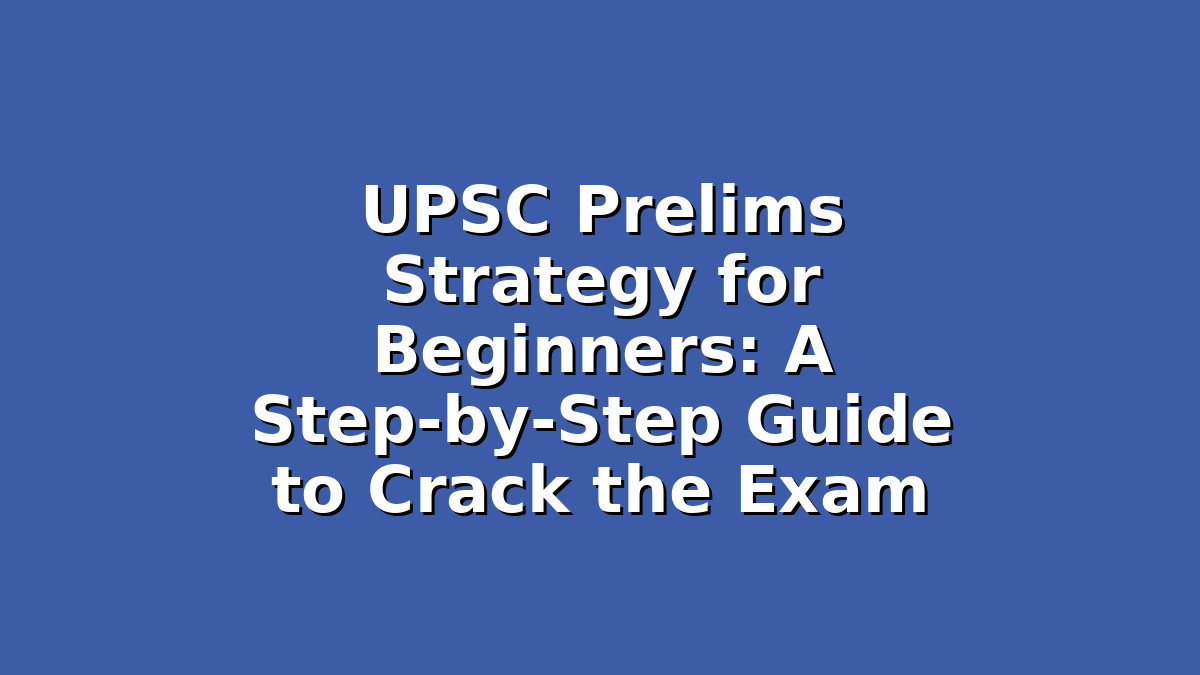Preparing for the UPSC Civil Services Preliminary Examination can feel overwhelming, especially for beginners. With thousands of topics to cover and a vast syllabus to manage, many aspirants struggle to find the right approach to start their preparation effectively. However, with a clear strategy, disciplined study habits, and the right resources, cracking the UPSC Prelims is absolutely achievable.
This blog post is designed specifically for beginners who want to build a strong foundation and develop a strategic plan for UPSC Prelims preparation. Whether you are just starting or looking for ways to improve your study routine, these tips will help you stay focused and motivated throughout your journey.
Understanding the UPSC Prelims Exam Pattern and Syllabus
Before diving into preparation, it’s crucial to understand the exam pattern and syllabus thoroughly. The UPSC Prelims consist of two papers: General Studies Paper I and CSAT (Civil Services Aptitude Test) Paper II.
– General Studies Paper I includes topics such as History, Geography, Polity, Economy, Environment, Science & Technology, and Current Affairs.
– CSAT Paper II tests your aptitude, logical reasoning, comprehension, and basic numeracy skills.
While Paper II is qualifying in nature (you need to score at least 33%), Paper I determines your ranking and qualification for the Mains exam. Hence, your main focus should be on General Studies Paper I.
Key takeaway: Familiarize yourself with the official UPSC syllabus published on the UPSC website and analyze past years’ question papers. This will give you clarity on important topics and the examiner’s pattern.
Section 1: Building a Strong Foundation with NCERT Books
Many beginners make the mistake of jumping into advanced books or coaching materials without mastering the basics. The truth is, UPSC questions are often conceptual and rooted in fundamental knowledge. This is where NCERT books become extremely valuable.
Why NCERT Books?
– They explain concepts in simple language.
– Cover all foundational subjects like History, Geography, Indian Polity, Economics, and Science.
– Help you build conceptual clarity, which is crucial for answering tricky UPSC questions.
How to Use NCERT Books Effectively
1. Start with Class 6 to 12 NCERTs: Begin with subjects like History, Geography, and Polity. For example, ‘India’s Ancient and Medieval History’ (Class 6-12), ‘Fundamentals of Human Geography’ (Class 11), ‘Indian Constitution at Work’ (Class 11), and ‘Indian Economic Development’ (Class 11, 12).
2. Make notes as you study: Write down key points, dates, definitions, and important concepts in your own words. This process reinforces learning and creates handy revision material.
3. Revise regularly: NCERTs should be your first revision source before moving on to advanced books or current affairs.
Tip: Don’t skip Science and Environment NCERTs as these topics frequently appear in Prelims.
Section 2: Incorporate Current Affairs and Daily Practice
Once you have a solid base from NCERTs, the next step is staying updated with current affairs and practicing regularly.
Why Current Affairs Matter
Current affairs are a major scoring area in UPSC Prelims. Questions related to government schemes, international relations, environment, economics, and significant national and global events are often asked.
How to Stay Updated
– Daily Newspaper Reading: Develop a habit of reading a good newspaper like ‘The Hindu’ or ‘The Indian Express’ daily. Focus on editorials, national news, international affairs, and environment sections.
– Monthly Current Affairs Magazines: Subscribe to reputed monthly magazines or compilations designed for UPSC aspirants. These help consolidate the vast amount of information in digestible formats.
– Online Resources: Follow official government websites, PIB (Press Information Bureau) releases, and trusted UPSC preparation portals for updates on schemes, policies, and reports.
Daily Practice and Mock Tests
– Solve daily quizzes and multiple-choice questions related to topics you study.
– Regularly attempt mock tests and previous years’ question papers to get familiar with the exam pattern and time management.
– Analyze your performance after each test—identify weak areas and work on them.
Tip: Make a habit of revising current affairs topics at least twice before the exam.
Section 3: Time Management and Consistent Study Routine
One of the biggest challenges for beginners is managing time effectively. UPSC Prelims preparation requires consistent efforts over months, so creating a balanced study plan is vital.
Create a Realistic Study Schedule
– Allocate fixed hours daily for study based on your personal routine.
– Divide your time so that you cover NCERTs, current affairs, and practice tests every week.
– Prioritize difficult subjects or topics you find challenging.
Stick to Your Plan
– Avoid distractions like excessive social media or unplanned breaks.
– Use productivity techniques such as the Pomodoro method (studying in focused intervals with short breaks).
– Keep weekends or a specific day for revision and mock tests.
Stay Motivated
– Set small, achievable goals weekly (e.g., finish a chapter, solve 50 questions).
– Reward yourself for milestones reached to keep morale high.
– Join study groups or online forums to share knowledge, clarify doubts, and stay motivated.
Healthy Routine
– Include regular exercise, meditation, or hobbies to reduce stress.
– Ensure adequate sleep and proper nutrition to keep your mind sharp.
Conclusion
Starting UPSC Prelims preparation can seem challenging, but with the right strategy, dedication, and patience, you can definitely succeed. Begin by understanding the exam pattern, build your foundation with NCERT books, stay updated on current affairs, and practice regularly with mock tests. Most importantly, manage your time wisely and maintain a balanced study routine.
Remember, UPSC is a marathon, not a sprint. Consistency and smart work will take you a long way. Stay positive, keep learning, and believe in your ability to crack this prestigious exam.
Best of luck on your UPSC journey!

Responses